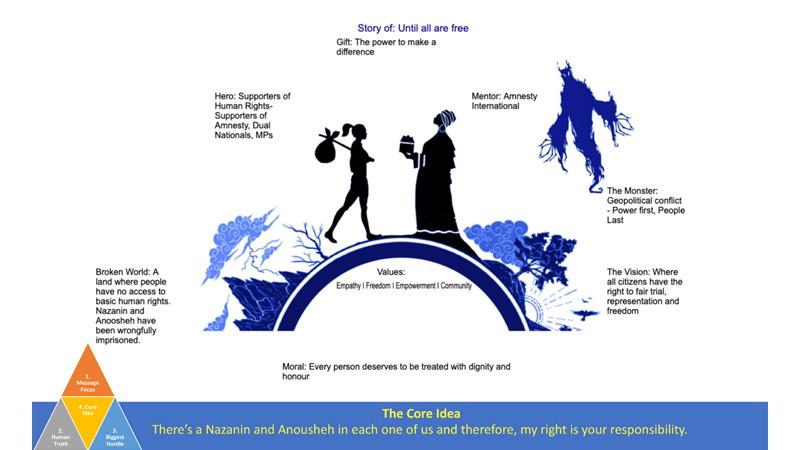Students on the Media, Campaigning and Social Change MA course celebrated the seventh year of pitching campaigns on social justice issues from charities Amnesty, The Eve Appeal, Sustain and Save the Children UK.

On Friday 26 March, the students pitched their ideas for strategic campaigns responding to live briefs written for them by the charities. Senior practitioners from the charities attended the pitches and praised the students’ research, strategic thinking and creativity.
The live briefs set out social justice challenges for the students to respond to, including reducing consumption of factory farmed meat, increasing awareness of the symptoms and prevention of gynaecological cancers among cisgender women, cisgender men, trans men and non-binary people, combating disinformation around the COVID-19 vaccine, supporting the release of political prisoners, and reframing the narrative on the international aid budget.
The live briefs are an integral part of the students’ core Strategic Campaign Communications module which takes them through the campaign planning stages that are followed by charity and NGO teams. At the start of the module, students chose their preferred brief and then researched the context, considered different strategic approaches, worked on SMART objectives and planned their audience segmentation and engagement approach, drawing on both academic concepts and practitioner best practice frameworks. The module includes masterclasses by leading charity practitioners on storytelling for social change and digital campaigning.
Talking about the pitches, Save the Children UK’s Director of Campaigns and Organising Tom Baker said: “I really enjoyed the session and look forward to reading the students’ final plans. I was very impressed with the quality of their ideas, and how effectively the students had been able to apply their learning to these real-world campaign examples.”
Sustain’s Climate and Nature Emergency and Sustainable Fish Cities Co-ordinator Ruth Westcott added: “We need innovative, exciting campaigning now more than ever – we have less than a decade to avert disastrous climate change and still very little action has been done on cutting industrial animal farming. It was great to hear such well researched and inspiring campaign pitches from the Westminster students. It gives me great hope for the next generation of campaigners.”
Some of the students spoke about their experience of the live pitches. Fadlynna Zulkarim said: “It was a great experience pitching our campaign ideas to real-life campaigning experts. It forced us to articulate our ideas in three minutes and then we got immediate valuable feedback.”
Fellow student Sarah Noles added: “Working on the pitch and the live brief more generally has been a challenging but incredibly energising experience. It’s such a rare and valuable opportunity to be able to work and get expert practitioner feedback on an assessment with such a direct connection to live, evolving issues that I care about, and have to continuously adapt as campaigners would in the ‘real-world’.”
Co-course Leader and Head of the School of Media and Communications Michaela O’Brien said: “The course team is deeply committed to a fusion approach, problem solving and active learning in the Media, Campaigning and Social Change MA. Working on live briefs is an invaluable opportunity for our students to reflect on real-world problems, apply their learning from the MA to those problems, and benefit from the feedback of experienced charity practitioners. We’re so grateful to the charities and NGOs who support the MA and enable us to offer this learning experience.”
Learn about Media and Communication courses offered at the University of Westminster.


